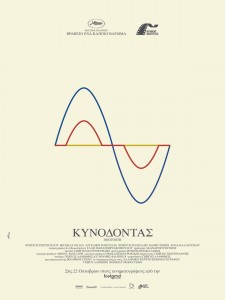Over at The Atlantic, Ian Bogost has a fascinating essay that frames itself as a discussion of the Star Trek: TNG episode “Darmok” (more easily remembered as the “Shaka, when the walls fell” episode, or the “Darmok and Jalad at Tanagra” episode, or that episode where Picard couldn’t build a fire because he was too busy dramatically holding knives, and Troi and Data both got really dumb, and the aliens kept talking weird about all their past successes and failures) and extends itself into a discussion of language, logic, allegory, and SimCity. In other words, Ian Bogost obviously wrote an essay about poetry, whether he meant to or not, and we should all read it.
LOSING CANINE TEETH: IDEAS SPURRED BY A MODERN GREEK FILM THAT IS NOT ABOUT MODERN GREECE
A DISTANCE FELT
I have a friend who I like spending time with but rarely end up seeing. The friend is a good person whose time means a lot, especially when it is shared with me. We call each other difficult, but what that means is that we like to hang out when we really want to, and refuse to negotiate our visceral wants for the other. It is a circumstantial friendship, despite its organicness. A major issue that arises frequently and poses Herculean efforts on both of our ends is that the friend lives in Brooklyn. [1] Despite the physical distance, it was the friend’s turn to come to me, because last time I went to Brooklyn, and I walked the Williamsburg bridge back and forth without ever seeing the friend, because the friend was asleep and never woke up and stood me up, and for that reason the friend would have to come to me this time and this was a non-negotiable term in an unwritten legal contract.
We decided to go to an East Village staple called “Sidewalk,” which is on Avenue A, and my friend grimaced a lot with my decision, because “how 90s grunge.” What the friend was going to witness would be a surprise, because this space was renovated ala gentrification in 2011 and there were no grimey aspects of my tall burger the very attractive (in a 90s way) waitress served me as she spoke in the familiar raspy voice that exuded bits of smoke here and there. [2]
What is interesting about where we chose to sit–which of course was the eastern side that functions as the smoking section of the outdoor seating area–is that it is located exactly near a gay bar called “Eastern Bloc,” which some people say belongs to Anderson Cooper’s boyfriend. [3] It was during our meal, or actually my meal since the friend was only drinking, on the smoking sidewalk that we witnessed a peculiar verbal fight in the street, the kind of fight that is violent only because of the words involved and how they were spat by people: aggressively and malevolently. It ended with someone calling a gay person a faggot, but the shock value was only increased when the assaulter and the gay person who stepped on his sneakers because he was too distracted by his phone were separated by a larger distance. It was then that the assaulter widened his eyes and tried to cajole his audience–us–with his empowering statement as he turned around and declared to bystanders of this incident: “It’s okay. I am gay, too.” READ MORE >
‘I now pronounce you…’
Before the advent of modernism at the turn of the 20th Century, narratives usually ended with an engagement, a wedding, or a death. The protagonists of the relatively new novel form would find themselves paired off at the altar, or suffering their own demise. This narrative move demonstrates the power of marriage as a kind of full stop, a solution, a smoothing-over, the point that a relationship should be headed, even if it may fail on the way. It’s significant that although writers have since cast aside marriage as the standard form of plot resolution, marriage itself still remains a potent cultural force in the 21st century.
I want to make it clear that I’m talking about a Western cultural understanding of marriage, which over the course of the 20th and 21st centuries has become a predominantly secular affair, where subjects are able to freely choose their own spouses, and virginity and chastity are no longer prerequisites. This is based on current marriage trends, although there will always be specificities and areas of difference. It’s also important to recognise that the concept of marriage has an array of different meanings and traditions in other cultures, both secular and religious, which are far too vast for me to even attempt to discuss here.
December 7th, 2012 / 4:42 am
Craft and the City: Writer as Flâneur

A while ago, Lily pondered the flâneur in this post, and in the comments section Ken referenced Nassim Taleb, and it seems that interest in the flâneur, like the figure of the flâneur itself, meanders around the consciousness of many of us, possibly. There is something perennially appealing and perhaps romantic about the flâneur–the apartness, the deliberate purposelessness–and I remember that it took, for me, reading Benjamin’s The Arcades Project to understand Baudelaire (the man and the work) in a more complete and meaningful way. Some years ago I wrote an essay (whose title is the title of this post) that sought to explore the idea of text-as-city and reader as flâneur, and then, by extension, the work of writing as its own kind of flânerie. (Really wanted to publish it as Flânerie O’Connor, but then I would’ve had to punch myself in the face really hard. And also get it published.) Anyway, here are some excerpts/cut-ups from that essay:
Linguistic Darwinism: Can a brand name kill the thing it was named after?
 Before Facebook, there were facebooks. When I was in college, “the facebook” was one name for the (ink and paper) Pomona student handbook’s most-perused section, the photo directory of incoming freshman. Other designations were the lookbook and, more crudely but most aptly, the menu. Plenty of schools had them and many also called them the facebook. Facebook corporate mythology has it that founder Mark Zuckerberg got the idea for Facebook from the facebook issued by his high school alma mater, Phillips-Exeter. In any case, this kind of directory is surely what the company was named after.
Before Facebook, there were facebooks. When I was in college, “the facebook” was one name for the (ink and paper) Pomona student handbook’s most-perused section, the photo directory of incoming freshman. Other designations were the lookbook and, more crudely but most aptly, the menu. Plenty of schools had them and many also called them the facebook. Facebook corporate mythology has it that founder Mark Zuckerberg got the idea for Facebook from the facebook issued by his high school alma mater, Phillips-Exeter. In any case, this kind of directory is surely what the company was named after.
Presumably, college students don’t need facebooks anymore because they have Facebook. I doubt they’ve been totally phased out, but I do wonder if they are still colloquially referred to as facebooks. Wouldn’t that be too confusing?
There are plenty of cases when a brand name became the de-facto generic name for something, like Kleenex or Coke (at least here in Atlanta) or Oreo. But this is a different phenomenon, wherein the brand name takes a generic thing’s name and applies it to a new form of that thing, thereby making the generic name and thing obsolete.
My father frequently uses the construction “all a-twitter.” Twitter is, after all, a verb meaning to make successive chirping noises (hence the Twitter bird icon) or to tremble with excitement (my dad’s usage is somewhat of an amalgam). Surely, much as people don’t say “gay” to mean “happy” anymore, uses of the generic verb twitter–when not in reference to micro-blogging–will diminish to nothing. But this still isn’t as extreme as the Facebook example, in that people are no less happy for not being called gay, and birds cheep no less for not being described as twittering, whereas colleges really might stop printing their own facebooks now that there is one big Facebook.
I’d love to hear if anyone can think of any other examples of this phenomenon, especially older examples–or was Facebook the first to murder its forebears?
Science Hour / Hop on the Magic Schoolbus!
httpvh://www.youtube.com/watch?v=yIMReUsxTt4
Via Robbie Cooper again. He’s on fire.
The meat of the linguistics stuff is around the 20 minute mark, but I recommend watching the whole thing diligently. Es bueno. (See what I did there?)
June 21st, 2009 / 8:37 pm


